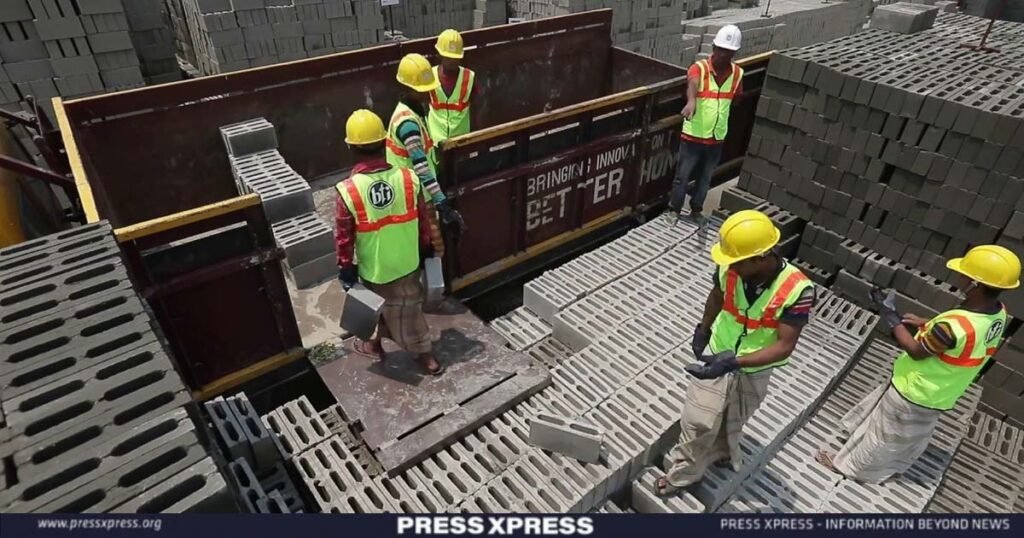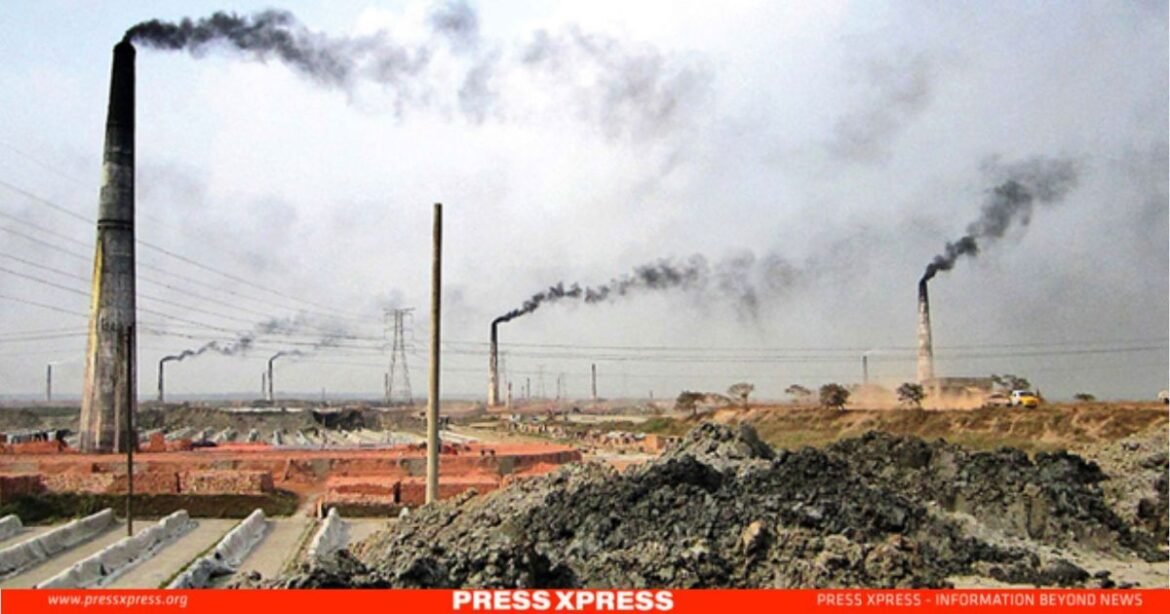Enforcing regulations and promoting sustainable block-based construction offer viable pathways toward a greener and healthier future
Bangladesh has undergone rapid urbanization in recent years, fueling a surge in demand for construction materials like bricks. However, the conventional method of brick production in the country poses significant environmental and health risks. Brick remains indispensable for development projects nationwide, yet the reliance on traditional methods threatens to exacerbate environmental degradation and public health concerns.
You can also read: Depreciation Saga: Electric Vehicle Resale Values Threaten Adoption
With a population nearing 170 million, Bangladesh confronts a formidable challenge in providing affordable housing. The country’s urbanization surge necessitates sustainable, environmentally friendly building materials to meet the populace’s needs. In response, eco-friendly bricks have emerged as a viable alternative to conventional clay bricks, offering a host of advantages.
Conventional brick production not only pollutes the air and contributes to deforestation but also poses a threat to arable lands, as the bricks are made from topsoil typically sourced from fields. Brick kilns dotting the country increasingly encroach upon agricultural lands.
In light of these concerns, the government has initiated various measures to promote alternative building materials, with Prime Minister Sheikh Hasina even urging government agencies to adopt these alternatives in their construction projects.
Brick Industry Evolution
Bangladesh ranks fourth in Asia for brick production and consumption, trailing China, India, Pakistan, and Vietnam. Over 7000 traditional brick kilns meet 99 percent of the country’s annual brick demand. Despite contributing 1 percent to the GDP, the traditional brick sector faces challenges like low energy efficiency, outdated technology, and reliance on clay. Transitioning towards cleaner processes and efficient technology is imperative.
Non-fired bricks, or alternative bricks (AB), present a promising solution. The government’s Housing and Building Research Institute (HBRI) and private entrepreneurs have been exploring AB since the late 90s. Currently, 15 organized AB manufacturing companies operate, with the top 5 controlling the majority of the market share. The AB market, valued at approximately BDT 900 million (USD 11 million), has grown steadily at 20 percent annually since FY 2014-15, with increasing interest from mid and large enterprises.
Products in the AB market include pavers, curb stones, solid concrete blocks, hollow concrete blocks, saucer drains, embankment protection blocks, and pavement tiles. Government agencies and industrial establishments drive over 60 percent of the market demand, with real estate companies and individual building owners contributing 25 percent and 10 percent, respectively.
Raw material sourcing and transportation account for 55 percent of the total cost of a standard alternative brick. Raw materials such as Sylhet Sand, pea gravel, stone dust, stone chips, cement, and water are primarily sourced domestically, though some manufacturers import materials from countries like India, Vietnam, and Oman.
Brick Kiln Regulation Laws
The Brick Manufacturing and Brick Kilns Establishment (Control) Act, 2013, was implemented to set forth regulations governing the siting of brick kilns, aimed at safeguarding human health and preventing adverse impacts on air and water quality in surrounding areas. This legislation serves to oversee the operations of the brick manufacturing sector and mitigate its detrimental effects on the environment.
- Section 4 of the act outlines penalties for engaging in brick production without proper licensing, stipulating that an individual in violation may face imprisonment for up to two years, a fine not exceeding Tk20-lakhs, or both.
- Under section 5 of the act, the excavation or gathering of soil from agricultural land or hills for use in brick production is prohibited. Offenders may face imprisonment for a maximum of two years, a fine not exceeding Tk5-lakh, or both.
- Similarly, section 6 of the act prohibits the use of firewood for brick kiln firing, with violators subject to imprisonment for a maximum of three years, a fine not exceeding Tk3-lakh, or both.
- Furthermore, as stated in section 8 of the act, it is unlawful to locate brick kilns within one kilometer of various designated areas, including residential, commercial, and protected zones, as well as governmental or private forests, educational institutions, and medical facilities. Failure to comply constitutes a punishable offense.
- Conversely, as per section 12 of the Environment Conservation Act, 1995, no industrial facility or project can commence operations without obtaining environmental clearance, rendering it illegal to establish such ventures without the requisite clearance certificate.
The overarching aim of these laws is to uphold environmental preservation while allowing for the continuation of traditional brick production methods.

Brick Kilns: Silent Killers
Environmental and health concerns arise from the operation of an illegal brick industry due to inadequate law enforcement, as highlighted in the World Bank‘s Bangladesh Environmental Survey Report 2023, which identifies brick kilns in Dhaka as the primary source of air pollution.
The emissions from brick kilns, characterized by black smoke, are causing various respiratory ailments among children and the elderly in the vicinity, including breathing difficulties, asthma, and pneumonia.
According to the Department of Environment’s data indicating a total of 7,881 brick kilns nationwide, the majority operate without proper authorization, underscoring the necessity for enhanced oversight. The utilization of wood in brick kilns by unscrupulous individuals, owing to lax law enforcement, is leading to deforestation, thereby depleting tree cover and exacerbating environmental degradation with pollutants released into the atmosphere.
The conventional brickmaking process poses significant air pollution concerns, severely impacting public health and agricultural productivity in surrounding areas. Consequently, the failure to effectively enforce existing laws results in the violation of constitutional guarantees of the right to life and legal protection, as enshrined in Articles 31 and 32.
Promoting Eco-Friendly Block Production
Boosting the production and advancement of block-based construction materials presents a viable alternative to conventional bricks. Transitioning to modern brick kilns from outdated ones can significantly mitigate the risk of environmental pollution. Opting for block-based construction over traditional brick structures not only reduces costs but also offers enhanced thermal insulation, providing cooler summers and warmer winters. Vietnam has mandated that 80% of state-built structures utilize block bricks.
Unlike traditional brick kilns, block brick manufacturing typically occurs in factories, which occupy less space and don’t involve firing processes. Additionally, block bricks can be tailored into various shapes based on demand.
It is imperative to enforce the adoption of blocks in all governmental development initiatives. To stimulate demand for block bricks, governmental bodies should widely propagate the advantages of block usage while highlighting the drawbacks of traditional bricks through electronic media, newspapers, and educational institutions.
Hence, prioritizing the establishment of eco-friendly block brick factories is essential, while discouraging the burning of soil in all brick kilns, both legal and illegal.
In conclusion, Bangladesh faces critical challenges in reconciling its developmental needs with environmental preservation, particularly in the brick industry. Transitioning to eco-friendly block production offers a sustainable solution, mitigating air pollution, protecting agricultural lands, and safeguarding public health. Effective enforcement of regulations and widespread adoption of alternative materials are imperative for a greener, healthier future.


